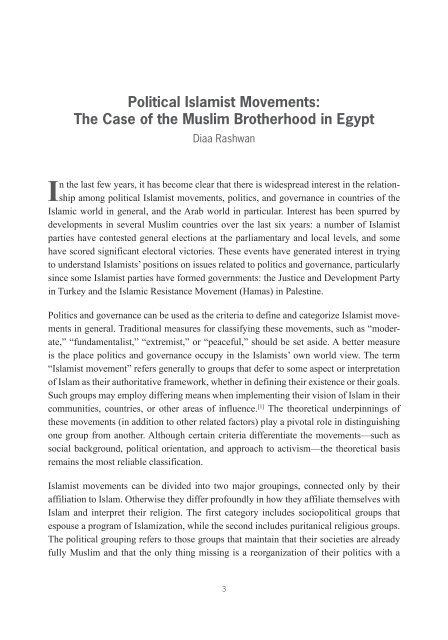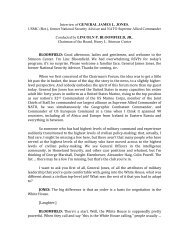Islam and Politics - The Stimson Center
Islam and Politics - The Stimson Center
Islam and Politics - The Stimson Center
Create successful ePaper yourself
Turn your PDF publications into a flip-book with our unique Google optimized e-Paper software.
Political <strong>Islam</strong>ist Movements:<br />
<strong>The</strong> Case of the Muslim Brotherhood in Egypt<br />
Diaa Rashwan<br />
In the last few years, it has become clear that there is widespread interest in the relationship<br />
among political <strong>Islam</strong>ist movements, politics, <strong>and</strong> governance in countries of the<br />
<strong>Islam</strong>ic world in general, <strong>and</strong> the Arab world in particular. Interest has been spurred by<br />
developments in several Muslim countries over the last six years: a number of <strong>Islam</strong>ist<br />
parties have contested general elections at the parliamentary <strong>and</strong> local levels, <strong>and</strong> some<br />
have scored significant electoral victories. <strong>The</strong>se events have generated interest in trying<br />
to underst<strong>and</strong> <strong>Islam</strong>ists’ positions on issues related to politics <strong>and</strong> governance, particularly<br />
since some <strong>Islam</strong>ist parties have formed governments: the Justice <strong>and</strong> Development Party<br />
in Turkey <strong>and</strong> the <strong>Islam</strong>ic Resistance Movement (Hamas) in Palestine.<br />
<strong>Politics</strong> <strong>and</strong> governance can be used as the criteria to define <strong>and</strong> categorize <strong>Islam</strong>ist movements<br />
in general. Traditional measures for classifying these movements, such as “moderate,”<br />
“fundamentalist,” “extremist,” or “peaceful,” should be set aside. A better measure<br />
is the place politics <strong>and</strong> governance occupy in the <strong>Islam</strong>ists’ own world view. <strong>The</strong> term<br />
“<strong>Islam</strong>ist movement” refers generally to groups that defer to some aspect or interpretation<br />
of <strong>Islam</strong> as their authoritative framework, whether in defining their existence or their goals.<br />
Such groups may employ differing means when implementing their vision of <strong>Islam</strong> in their<br />
communities, countries, or other areas of influence. [1] <strong>The</strong> theoretical underpinnings of<br />
these movements (in addition to other related factors) play a pivotal role in distinguishing<br />
one group from another. Although certain criteria differentiate the movements—such as<br />
social background, political orientation, <strong>and</strong> approach to activism—the theoretical basis<br />
remains the most reliable classification.<br />
<strong>Islam</strong>ist movements can be divided into two major groupings, connected only by their<br />
affiliation to <strong>Islam</strong>. Otherwise they differ profoundly in how they affiliate themselves with<br />
<strong>Islam</strong> <strong>and</strong> interpret their religion. <strong>The</strong> first category includes sociopolitical groups that<br />
espouse a program of <strong>Islam</strong>ization, while the second includes puritanical religious groups.<br />
<strong>The</strong> political grouping refers to those groups that maintain that their societies are already<br />
fully Muslim <strong>and</strong> that the only thing missing is a reorganization of their politics with a<br />
3

















